| Article Overview:
How did Iraq and Iran, and the Middle East come to be as they are today?
For those wondering why the Middle East is a puzzle, the movie
Lawrence of Arabia is a great historical teacher. Viewing
it is not only entertainment, but a journey toward understanding the
massive conflicts the United States faces in reconstructing the
desert. |
 VigilanceVoice VigilanceVoice
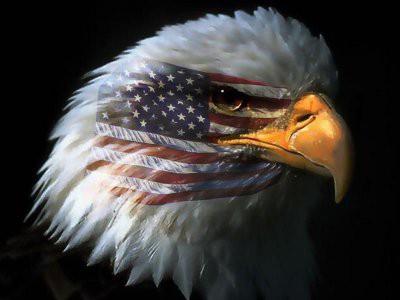
www.VigilanceVoice.com
Monday--August
4, 2003—Ground Zero Plus 691
___________________________________________________________
Lawrence of Arabia--A Roadmap To
Understanding Terrorism In The Middle East
___________________________________________________________
by
Cliff McKenzie
Editor, New York City Combat Correspondent News
|
GROUND ZER0, New York, N.Y.--Aug. 4,
2003-- In the opening minutes of the classic film, "Lawrence of
Arabia," a Bedouin guide bringing T.E. Lawrence to see Arabic Prince
Feisal is shot in the head by a rival Serif played by Omar Sharif.
The Bedouin's crime was drinking water from another tribe's well.
Drinking water belonging to another without permission was punishable
by death.
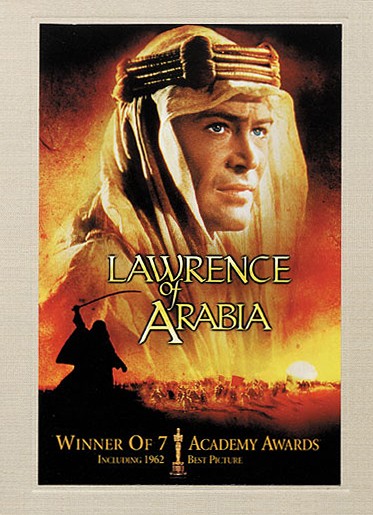 |
|
Movie
synopsis: Sweeping epic about the real life adventures of T.
E. Lawrence, a British major who unified Arab tribes and led them
in the fight for independence from the Ottoman Turks in the 1920s |
The scene is momentous, for it
serves as an example why the Middle East is a nation of tribes,
divided and walled by centuries of conflict, and suggests the legacy
of conflict between tribes may take more than America's occupation of
the countries of Afghanistan and Iraq to bring even a portion of the
Middle East into a state of unity.
Bookending the opening scene is another startling example of
the difficulties America and its allies faces. It occurs near
the end of the movie when the Arabic tribes take over Damascus under
British Major Lawrence's leadership. The newly formed Arab
National Council engage in a bitter tribal fight over who is in charge
of the electricity and telephones. Unable to resolve their
personal conflicts, the tribes leave Damascus to the British who are
technically skilled in keeping the engines of urbanization well oiled.
Between the opening and ending of the 1962 Academy
Award winning film that runs 227 minutes, lies countless pools of
blood, sucked up hungrily by the thirst desert.
Death, it appears, is like swatting flies, as Lawrence
of Arabia quickly finds when he must execute the very man he saved
from the desert's cruel sun to keep the peace between tribes about to
join in the attack on the port of Accaba. Actor Anthony
Quinn, playing a rival tribal leader who is more mercenary than
loyalist, tells Lawrence, brilliantly played by Peter O'Toole:
"You gave life, now you take it."
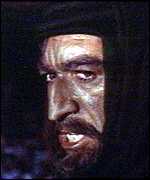
|
|
"You gave
life, now you take it" -Auda abu Tayi |
It has been a number of years
since I've watched the movie, and never have I viewed it with more
interest than now, in the wake of the challenges the United States
faces not only in Iraq, but as it ventures into West Africa to tackle
the bloodshed and violence in Liberia.
As a westerner, born into a technologically advanced
civilization, I take for granted the things of comfort such as running
water, electricity, hospitals, police, public safety and the freedom
to travel and drink out of water fountains without fear of being shot.
The land of the desert is harsh, and the
people who live in its shifting sands are even more harsh in their
hunger to protect their legacies of beliefs.
In Iraq and Iran, there are great barriers
standing between the tribes, some that may be temporarily, or perhaps
forever, insurmountable.
 |
|
Despite its
pristine beauty, the land of the desert is harsh, and its people
are even harsher in their hunger to protect their legacies of
beliefs |
Lawrence of
Arabia re-emphasized for me the complexity of the Middle East, and
caused me to better appreciate a culture and its rich history I often
think I understand.
In a tragic message that America and other
western nations engaging in the Middle East might wish to deny, even
Lawrence of Arabia was unable to assimilate the ways of life.
Peter O'Toole, in a great scene of frustration, pinches his white skin
and looks painfully at his close friend, Serif Ali ibn el Kharish,
played by Omar Sharif, and cries: "I cannot change this."
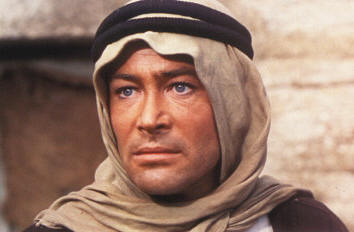
|
|
Peter O'Toole
earned an Academy Award for his role of Lawrence of Arabia
in the movie |
He bemoans he is
white, born English, not Arabic. At that moment, you know
if he could have one wish, it would have been to be born Middle
Eastern so he could become truly part of what he was fighting for, and
not stand on the outside of the ring looking in.
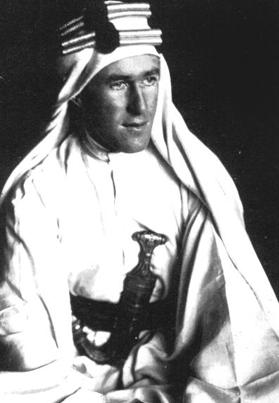
|
|
Colonel T. E.
Lawrence led the people of the Arabian peninsula to independence |
It is easy to look at the
tribal warriors as Terrorists, seeking to inflict Fear, Intimidation
and Complacency upon others for the sheer sake of Terror.
While this might be true of some, there is something deeper that comes
out of the film, at least, for me.
It was the message of brutal violence resulting
from generations of brutal life. Life and death had
little difference in the film, evidenced by the tragic loss of two
young orphaned companions of Lawrence who died in his service, one
sucked down in a hole in the sand, the other killed by Lawrence so the
Turks would not torture him after the boy was wounded by a detonator
that ripped open his belly.
Lawrence of Arabia is a look behind the veils of
the Middle East. It shows the Arabs fighting in the 1920's for
their independence from the Turkish Ottoman Empire, and reminds us
that the struggle for independence has been long and bloody.
Even though thousands of years are vested in the
history of the tribes, little time has been given the people to learn
to live as one.
I thought of the United States and its allies as
being a sort of Lawrence of Arabia in the 21st Century.
As Major Lawrence sought to unify the land and bring peace and
prosperity to the sand, so is America trying to rally the tribes to
act as one.
But then I thought about the ending of the film,
and the scene with the tribes trotting away from the heart of
civilization back to their tents and sand, to live a life void of many
things we treasure.
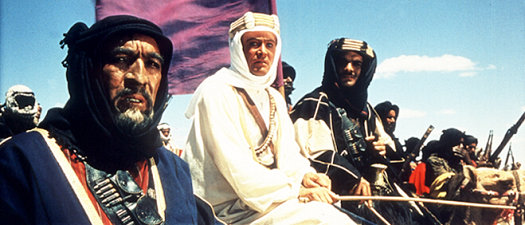
|
|
Lawrence
(O'Toole) was successful in getting the tribal chief Auda (Quinn
on the left) and Ali (Omar Sharif on the right) to work together |
I was reminded of the
final words of Anthony Quinn, who plays Auda abu Tayi, the mercenary
tribal chief. As Lawrence is sitting defeated in the empty
hall where he attempted to get the tribal chiefs to work together in
Damascus, Quinn urges him to come with him to the desert, to leave
behind the trappings of civilization.
"This," Quinn says waving at the buildings, "this all
means nothing."
In a way, he is correct.
We fight to civilize ourselves with conveniences, and
become so dependent on them we forget they are our servants and become
slaves to them. When the lights fail we become afraid of
the dark. When noises frighten us we cower.
When our feelings are hurt we cry "victim" and lash out in revenge.
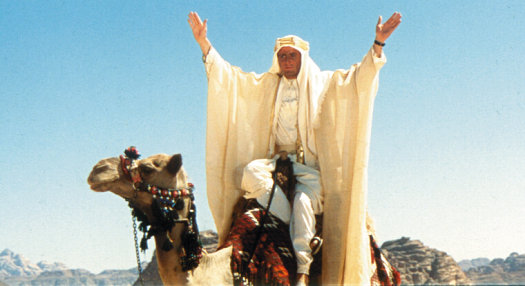 |
|
Watching
Lawrence of Arabia might help us in our Vigilant understanding of
our roles with other nations |
In ways, the desert life
was without Terror, for it took constant Courage, Conviction and Right
Actions to survive.
Modern life, at least in the eyes of the tribes,
was Terror. To rely on a light switch or a water spigot,
or someone to protect you from harm, all ran in opposition to the
beliefs of the tribal chiefs.
Perhaps, if we all watched Lawrence
of Arabia again, and thought of our role with other nations, we might
find our quickness to change their way of lives tempered with a
reality that they might know more than we about Vigilance.
Aug
3--Burying The Bodies Of Terrorism
©2001
- 2004, VigilanceVoice.com, All rights reserved -
a ((HYYPE))
design

|
| |
|
|